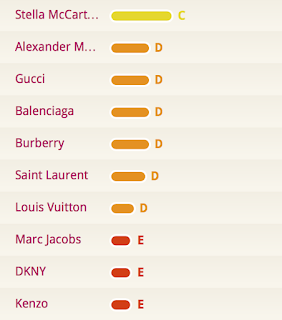'Rank a Brand' (rankabrand.org) is an independent brand-comparison website that transparently assesses and ranks consumer brands in several sectors on sustainability and social responsibility.
The Mission
Rank a Brand contributes to a transition towards a sustainable and fair global economy by encouraging brands to continuously perform more responsibly, driven by consumers continuously making more responsible shopping choices. They do this by:
1. Creating a large international movement and a well-used tool by and for consumers to assess and compare policies and performance of brands on sustainability and social responsibility.
2. Creating pressure on brands through consumers, media and competitors to continuously improve their policies and performance on sustainability and social responsibility, and to be fully transparent on this.
3. Increasing awareness among consumers of their responsibility and influence on brands, and encouraging and facilitating them to select sustainable and fair brands.
Rank a Brand encourages both consumers and brands to act responsibly, sustainably and fair, directly as well as through publicity and social media.
Rankings
The website uses a ranking system from A-E, A being the highest and E the lowest in regard to sustainability.
Luxury Brands
Below is a list of luxury fashion brands alongside their ranking. Findings from this list show that only one brand, Stella McCartney, has achieved a 'C' ranking - this meaning the brand is found to be 'on its way to sustainability, but with more improvement needed.'
Following this, there are few brands who have achieved a 'D' ranking - this meaning these brands have 'started to take sustainability in to account' but still have a lot more to do. These brands include Alexander McQueen, Gucci, Burberry and Louis Vuitton.
All other brands have been given an 'E' ranking - this meaning the brands have communicated hardly any evidence about policies for environment, carbon emissions or labor conditions in low-wages countries, which for consumers is unclear whether they are committed to sustainability or not but is suggestive of the latter. These brands include Marc Jacobs, Fendi, Dior, Chanel and many many more.
The rankings of these brands show that ultimately, sustainability is not the greatest of concerns for any within the luxury sector, with all having potential to do more to contribute to environmental progression. It would seem that sustainable luxury is hard to come by as a result of the niche desires of the high-end consumer for abundance of materials and expectations of grandeur, of which these brands must meet in order to achieve and maintain the greatest market yield.
The only resolution to this being devices and strategies that have sustainability as an equal consideration to aesthetic and perception that maintain the familiarity of the appearance of luxury and high-end upwards comparison potentials.



No comments:
Post a Comment